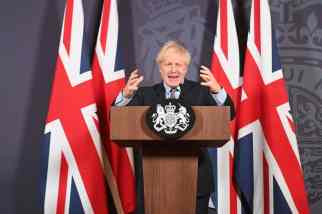Brexit breakthrough comes with costs
Read this article for free:
or
Already have an account? Log in here »
To continue reading, please subscribe:
Monthly Digital Subscription
$19 $0 for the first 4 weeks*
- Enjoy unlimited reading on winnipegfreepress.com
- Read the E-Edition, our digital replica newspaper
- Access News Break, our award-winning app
- Play interactive puzzles
*No charge for 4 weeks then billed as $19 every four weeks (new subscribers and qualified returning subscribers only). Cancel anytime.
Read unlimited articles for free today:
or
Already have an account? Log in here »
Hey there, time traveller!
This article was published 28/12/2020 (1361 days ago), so information in it may no longer be current.
The people of Britain, gradually deciphering 1,200 pages of trade-treaty legalese, are finding out this week what exit from the European Union actually amounts to. Mostly, it amounts to grand assertions of U.K. sovereign independence qualified by small print that limits sovereign independence.
Whether British people like it or not, it’s what they’re getting. The Conservative government is sponsoring the trade treaty and calling it the achievement of their promised Brexit. The Labour opposition, having no better solution, will not oppose it. The 27 member governments of the European Union have already endorsed it through their Brussels ambassadors.
The U.K. will be free to set its own labour and environmental standards. But if European firms complain of unfair British cost-cutting, the EU could impose countervailing tariffs on U.K. products. So the U.K. has won back its freedom — and agreed to accept punishment if it exercises that freedom in ways that offend Europe.
U.K. fishing boats will immediately increase their share of the catch in U.K. national waters during a five-and-one-half year transition period. After that, fishing rights will be renegotiated annually.
Doctors, veterinarians, engineers, architects and other professionals will no longer enjoy automatic recognition of their professional credentials on either side of the English Channel. U.K. professionals will have to seek local recognition in any European country where they wish to practise.
So the U.K. has won back its freedom– and agreed to accept punishment if it exercises that freedom in ways that offend Europe.
U.K. truckers can still drive loads into Europe, but they are cut back to one drop-off from the present three in the destination country. U.K. airlines, similarly, can fly into a European country but not into two of them on the same trip.
The EU will announce later whether U.K. data protection laws are good enough to allow U.K. access to European data banks. Europe will also decide later whether it will allow British banks, some of which have already moved to Paris or Munich, to serve European clients from London.
Generally speaking, the European Court of Justice will cease to exercise jurisdiction in the U.K. In Northern Ireland, however, because of its close ties to the Irish Republic, the ECJ will still be the highest legal authority in disputes over the application of EU customs union and single market rules. The parties will figure out later how to manage chemical and pharmaceutical product safety and how to evaluate overseas content in U.K.-made cars sold into Europe.
It leaves the U.K. and the EU closely tied to each other, wrapped in new layers of red tape and locked in perpetual negotiation.
Most of this is not what Leavers wanted four-and-one-half years ago when they voted to leave the EU. Nor is it what Remainers wanted when they voted to remain. It leaves the U.K. and the EU closely tied to each other, wrapped in new layers of red tape and locked in perpetual negotiation, because they are each other’s largest trading partners, much like Canada and the U.S.
Canada has been for 32 years a trade treaty partner of the United States, which has nine times our population and nine times our economic power. The relationship is sometimes difficult but Canada has learned how to make it work most of the time.
The U.K. is now entering into a comparable deal with the EU, which has seven times Britain’s population and seven times its weight in the market. Britons will have to learn to take what their more powerful neighbour dishes out — as Canadians have learned — because they cannot risk jeopardizing the trade connection that keeps their country in business.












